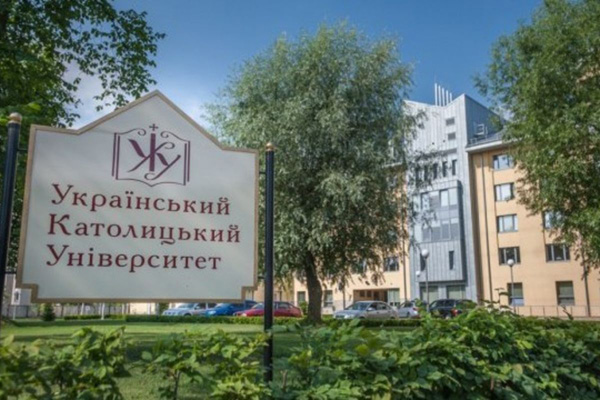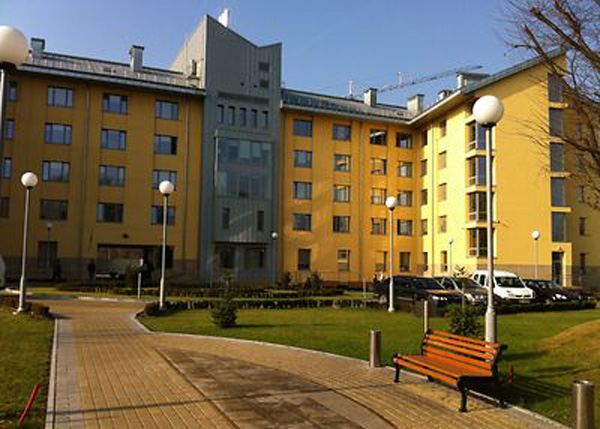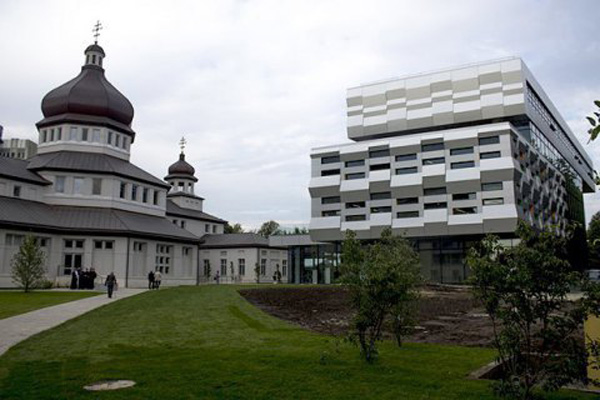Ukrainian Catholic University
Ukrainian Catholic University [Український католицький університет; Ukraїns'kyi katolyts'kyi universytet]. Private university in Lviv affiliated with the Ukrainian Catholic church.
One of the earliest institutions to train Greek Catholic clergy in western Ukraine was Greek Catholic general seminary founded by Empress Maria Theresa in 1774 at Saint Barbara's Church in Vienna (the so-called Barbareum). It was closed in 1784, to be replaced by the Greek Catholic Theological Seminary in Lviv. Apart from the seminary, the newly founded Lviv University included Studium Ruthenum (est. 1787)—an institution intended for Greek Catholic seminarians who did not know Latin. All courses at Studium Ruthenum were taught in the literary Ruthenian language (known as Slaveno-Rusyn), and this institution helped foster an entire generation of enlightened Greek Catholic priests before it was closed in 1809. Thereafter, most Ukrainian students studied in Lviv University’s Department of Theology which became the first of the university’s departments where instruction in the Ukrainian language was introduced in the second half of the 19th century. It was followed by the Department of Law where Ukrainian-language instructions were offered in 1862–72. However, all attempts at establishing a separate Ukrainian secular university in the Habsburg Empire failed because of the continuous opposition of the Polish elites. It was only Metropolitan Andrei Sheptytsky who brokered a far-reaching deal between Poles and Ukrainians in Galicia in 1914, which presupposed, among other measures, the opening of a separate Ukrainian university. The outbreak of the First World War later that year and the subsequent dissolution of Austria-Hungary in the fall of 1918 delayed for many years the opening of any Ukrainian institution of higher learning in Galicia.
In the interwar Poland the Galician Ukrainians lost almost all of the gains they had enjoyed under the Habsburg rule. The Ukrainian Catholic church led by Metropolitan Andrei Sheptytsky was a sole Ukrainian institution that was allowed to function relatively undisturbed. Thanks to his personal contacts with prominent members of the Polish society, Sheptytsky managed to establish the Greek Catholic Theological Academy in Lviv in 1928, which at the time was the only institution of higher learning for Ukrainians in Polish-ruled western Ukraine. Rev (later metropolitan and cardinal) Yosyf Slipy was appointed the academy’s first rector. Initially, the academy consisted of only the faculties of philosophy and theology, but in the fall of 1939 it opened the faculty of law. The academy’s faculty included Metropolitan Sheptytsky, Bishop Mykola Charnetsky, reverends Yosyf Slipy, Tyt Myshkovsky, and Vasyl Laba, and laymen Mykola Chubaty, Ivan Krypiakevych, Yaroslav Pasternak, Konstantyn Chekhovych, Volodymyr R. Zalozetsky-Sas, and Borys Kudryk.
In 1939, during the first Soviet occupation of Galicia, the academy was shut down and many of its students were persecuted. The academy reopened its doors during the Nazi occupation. The total enrollment between 1941 and 1944 was 97 students. In 1945, with the Soviet reoccupation of the region the Greek Catholic Theological Academy was once again shut down, while most of its faculty (including the first rector and later the leader of the Ukrainian Catholic church Yosyf Slipy) and students were deported to the GULAG concentration camps. In various forms, the academy’s traditions continued to preserved in emigration. In 1963 Metropolitan Yosyf Slipy, who was allowed to emigrate to the West, founded the Ukrainian Catholic University (Rome) in Italy (named in honor of Pope Saint Clement I) and re-established the academy as its faculty of theology.
With the reopening of Lviv Theological Academy in 1994 by the Lviv synod of bishops of the Ukrainian Catholic church the Ukrainian Catholic University (Rome) was reorganized into a branch of the academy: the Institute of Pope Saint Clement I. In 1998 the academy’s bachelor’s program in theology was accredited by the Congregation of Catholic Education, and the diplomas of the academy’s graduates have since been recognized by Catholic educational institutions worldwide. In 2001 the faculty of history and the graduate program in theology were added. The same year, during his visit to Lviv, Pope John Paul II blessed the cornerstone for the construction of the academy’s new building. In 2002 the academy was reorganized as the Ukrainian Catholic University (UCU). Among the UCU’s founding fathers who combined the idea of Western liberal arts education with the spiritual legacy of the Greek Catholic church was Rev (later bishop) Borys Gudziak, a Harvard-trained historian and the UCU’s current president; professor of classical languages Jeffrey Wills, then vice-rector for development; Rev Mykhailo Dymyd, the first rector of the Lviv Theological Academy; and Myroslav Marynovych, currently the UCU’s vice-rector for university mission. In 2007 Ukraine’s ministry of education issued a license that permitted UCU to award bachelor’s, master’s, and specialist’s degrees in several disciplines, among them theology, history, and social pedagogy. In 2015 the UCU further expanded its curriculum by launching a program in computer sciences which soon became the single largest field of study at the university.
As of 2020 the UCU consists of five faculties (philosophy and theology; humanities; health sciences; social sciences; and applied sciences) and the Lviv Business School—one of the very few business schools in Ukraine that awards its graduates an internationally recognized Key Executive MBA. There are also several autonomous teaching and research ‘schools,’ such as the Law School (affiliated with the faculty of social sciences); School of Bioethics (affiliated with the faculty of philosophy and theology); School of Ukrainian Language and Culture; and School of Public Management. The UCU also houses a number of research and educational centers and institutes, including the Center of Modern Foreign Languages; the Center for Educational and Innovative Technologies; the Emmaus Center for People with Disabilities; the Institute of Ecumenical Studies; the Institute of Church History; the Institute of Religion and Society; the Catechetic and Pedagogical Institute; the Institute of Church Music; and the Institute of Leadership and Management.
The earliest building of the restored Lviv Theological Academy dates back to the mid-1920s. The recently inaugurated new UCU campus is among the most outstanding examples of college architecture in contemporary Ukraine. The Patriarch Yosyf Slipy Collegium (completed in 2012) is a residential hub of the university community that includes a dormitory for students, instructors, and guests. The so-called ‘innovative academic building’ (2013) houses the faculties of the humanities and of applied sciences, as well as provides a study space for students of the Lviv Business School and few other academic programs. The crown edifice of the campus is the Metropolitan Andrei Sheptytsky Center (designed by internationally acclaimed architects and opened in 2017) that hosts classrooms, conference rooms, cultural venues, and the library. The UCU library is one of the largest modern humanities libraries in Ukraine. It was established on the basis of the library collection of the Greek Catholic Theological Academy and contains over 146,000 titles of books and about 2,600 periodicals. Among the highlights of the collection is a Byzantine studies library collected by historian Hans-Georg Bosk (2,569 books); an Italian-language collection (222 titles); Ihor Ševčenko’s library of Byzantine studies (8,080 publications); and the collection of theological literature donated by the theological faculty of Tilburg University (8,892 books).
The UCU’s publishing house was founded in 2003 and it has since become one of the most prolific academic publishers in Ukraine, especially in the fields of theology, history, classical philology, and philosophy. So far, it has published more than 150 titles of original and translated works. The university’s main periodical is Naukovi zapysky Ukraїns'koho katolyts'koho universytetu (published since 2009) that appears in series, such as theology, history, philosophy, pedagogy, psychology, and journalism. Other periodical publications include Kovcheh. Naukovyi zbirnyk z tserkovnoї istoriї (8 vols, 1993–2018), Metron. Zhurnal z tserkovnoho prava (8 vols, 2003–11), and Acta studiosa historica. Students'kyi naukovyi zbirnyk (5 vols, 2010–16).
In 2019 the UCU was ranked no. 100 in the Consolidated Ranking of 240 Ukrainian colleges and universities conducted by the educational web portal Osvita.ua. The same year it was also ranked no. 1 out of 200 Ukraine’s colleges and universities according to GPA of the applicants enrolled in the fee-paying programs and based on the External Independent Evaluation (ZNO) of secondary school graduates. The UCU is also among Ukraine’s top universities when it comes to the international experience of its faculty members and students. For example, in the 2018–19 academic year one out of five faculty members took part in various programs abroad where they taught, conducted research, and/or presented at conferences. Students, too, actively participated in academic exchange programs: 143 students (8% of all UCU students) took part in seasonal schools and internships abroad, while further 51 (3% of all students) studied for a whole semester abroad. As of 2019 the enrollment was 1,189 undergraduate and 633 graduate students (including 17 doctoral students, most of whom pursued history and archeology).
The UCU faculty includes a number of renowned academics and educators, among them historians Rev Borys Gudziak, Iaroslav Hrytsak, Ihor Skochylias, Tetiana Hoshko, Ostap Sereda, and Oleksandr Zaitsev; theologians and scholars of religion Viktor Zhukovsky, Rev Mykhailo Dymyd, Rev Oleh Kyndii, Mariia Horiacha, and Vasyl Rudeiko; philosophers Orysia Bila, Volodymyr Turchynovsky, Taras Dobko, and Mykhailo Cherenkov; sociologists Viktor Susak, Viktoriia Sereda, and Oksana Mikheieva; philologists Iryna Starovoit, Uliana Holovach, Iaroslava Melnyk, Olena Haleta, and Danylo Ilnytsky; economist Iaroslav Prytula; mathematician Rostyslav Hryniv; and computer scientists Andrii Romaniuk and Oleksii Molchanovsky.
BIBLIOGRAPHY
The official UCU website: https://ucu.edu.ua/
Serhiy Bilenky
[This article was written in 2020.]


